

OS Therapies, Inc. (NYSEAMERICAN: OSTX) is a clinical-stage biotech company that is developing innovative cancer treatments, including immunotherapies that harness the immune system to fight tumors, as well as advanced drug technologies designed to deliver chemotherapy more precisely to cancer cells while reducing side effects.
Their lead candidate, OST-HER2, is a groundbreaking cancer immunotherapy designed to teach the immune system to identify and destroy cancer cells that produce a protein called HER2. This easy-to-administer treatment uses a harmless version of a bacteria called Listeria monocytogenes to activate the body's natural defenses. A planned Phase 1 trial for using OST-HER2 to treat breast cancer and other HER2-positive tumors is scheduled for 2025.
NYSEAMERICAN: OSTX
IR Website: https://ir.ostherapies.com
NYSE Profile: https://www.nyse.com/quote/XASE:OSTX
Headquarters: Rockville, Maryland
Investor Contact: Gerald Commissiong - irpr@ostherapies.com
TALK TO MANAGEMENT
OS Therapies is always available to talk to current and potential investors. They're happy to answer any questions you may have and tell you what makes their story unique. Please fill out this form, and we will connect you shortly.
OS Therapies, Inc. At-A-Glance
OS Therapies, Inc. (NYSE-A: OSTX) is a clinical-stage biotechnology company dedicated to developing innovative cancer treatments. The company focuses on two key areas: immunotherapies, which harness the body’s immune system to fight cancer, and tunable antibody-drug conjugates (ADCs), which are precision-targeted cancer therapies designed to minimize damage to healthy cells.
At the heart of OS Therapies’ pipeline is OST-HER2, a first-in-class immunotherapy for treating osteosarcoma, a rare and aggressive bone cancer affecting both pediatric and adult patients. OS Therapies is also advancing its proprietary tunable ADC platform, which aims to offer customizable, highly targeted therapies for a broad range of cancers. With a focus on tackling some of the toughest challenges in oncology, the company is leveraging clinical trial progress and regulatory support to advance innovative therapies that could transform patient care.
Key Considerations:
Press Releases & Media Coverage
Social Media Updates

Recent LinkedIn Posts
Recent Facebook, Instagram, X, YouTube, TikTok and Pinterest Posts
Investor Presentation


To download the OS Therapies investor presentation, please fill out the form below.
Immunotherapy and Precision Medicine for Cancer

OS Therapies, Inc. is a clinical-stage biotechnology company developing advanced treatments for rare and difficult-to-treat cancers. By leveraging the body’s immune system through immunotherapy and employing precision medicine principles, OS Therapies aims to create therapies that are both highly effective and less toxic. Their approach combines cutting-edge scientific platforms with targeted delivery methods to improve patient outcomes, particularly for those with limited treatment options. This dual strategy activates and directs the immune system to identify and destroy cancer cells while minimizing damage to healthy tissue.
The company’s lead program, OST-HER2, reflects its focus on tackling high unmet medical needs. This innovative immunotherapeutic vaccine is designed to treat osteosarcoma, a rare and aggressive bone cancer, and has potential applications for HER2-positive breast cancer. OST-HER2 uses a bioengineered version of the bacteria Listeria monocytogenes to trigger a strong immune response, targeting HER2-positive cancer cells with precision. As an “ultra-orphan” program, OST-HER2 addresses conditions that affect small, underserved patient populations with limited treatment options.
In addition to OST-HER2, OS Therapies is advancing its tunable Antibody-Drug Conjugate (tADC) platform, a next-generation technology that represents a breakthrough in precision cancer treatment. The tADC platform features a patented silicone linker that allows for the targeted delivery of cancer-killing drugs directly to tumors. By releasing the drugs only in the acidic environment of cancer cells, the tADC platform improves safety and minimizes side effects associated with traditional chemotherapy. This modular technology is designed to be adaptable, supporting a wide range of therapeutic applications for cancers beyond osteosarcoma.

Source: Company Documents
What sets OS Therapies apart is its emphasis on innovative approaches to both human and veterinary oncology. With its flagship OST-HER2 program receiving recognition through regulatory designations like Rare Pediatric Disease and Orphan Drug status, the company is well-positioned to bring transformative therapies to market. Moreover, using a modular and adaptable platform, such as the tunable ADC, gives OS Therapies a technological edge by enabling customizable treatments for a wide array of cancers. This dual focus on immunotherapy and precision drug delivery underscores their mission to redefine cancer care for underserved patient populations.
Significant Market Opportunity

OS Therapies is targeting large, unmet needs in oncology with its therapeutic pipeline, focusing on osteosarcoma and HER2-positive solid tumors. Osteosarcoma, a type of bone cancer, has a total addressable market (TAM) of $1.7 billion for human applications (adults and pediatrics) and $150 million for canines. HER2-positive solid tumors, which include breast, bladder, and esophageal cancers, represent a $55 billion market. Additionally, the company’s tunable ADC (tADC) platform is positioned to address the broader global cancer treatment market, encompassing both chemotherapy and immunotherapies.
Osteosarcoma, a rare and aggressive bone cancer, primarily affects adolescents and young adults, with most cases diagnosed between the ages of 15 and 20. Classified as a solid tumor (a cancer that forms a mass or lump), osteosarcoma has seen no new treatments in over 40 years. Recurrence occurs in approximately 50% of patients, and once the cancer returns, it spreads rapidly to organs such as the lungs and brain. The prognosis for recurrent osteosarcoma is grim, with an 80-90% mortality rate and a life expectancy of just 12 months following recurrence. The current standard of care for primary osteosarcoma typically involves surgery, such as amputation, combined with nine months of aggressive chemotherapy that carries a 10% treatment-related mortality rate. Unfortunately, there are no approved treatments for secondary or recurrent osteosarcoma, highlighting a significant unmet need.

Source: Company Documents
The company’s lead program, OST-HER2, is designed to address these challenges by preventing osteosarcoma recurrence and improving overall survival rates. This innovative immunotherapy uses a bioengineered Listeria monocytogenes bacterium to activate the immune system against HER2-positive cancer cells. HER2 (human epidermal growth factor receptor 2) is a protein found on the surface of some cancer cells, promoting their growth. OST-HER2 has demonstrated promise not only in treating osteosarcoma but also in a range of HER2-positive solid tumors, including breast, bladder, and esophageal cancers. By enhancing immune system activity, OST-HER2 aims to disrupt tumor progression and reduce the likelihood of recurrence.
Beyond osteosarcoma, OS Therapies is exploring OST-HER2’s potential in treating HER2-positive solid tumors more broadly. In these cancers, OST-HER2 could complement existing therapies like trastuzumab, a common antibody treatment for HER2-positive cancers, by potentially preventing resistance to these drugs. For example, in gastroesophageal cancers, OST-HER2 may extend the efficacy of trastuzumab after initial treatments fail. Similarly, OST-HER2 can potentially improve the response to colorectal cancer treatments by increasing immune cell activity in HER2-positive subtypes. These applications underscore OST-HER2’s versatility and ability to address a wide spectrum of HER2-driven malignancies.

Source: Company Documents
OS Therapies’ broader pipeline also includes the tunable ADC (tADC) platform, representing a next-generation approach to precision cancer treatment. Unlike traditional chemotherapy, which affects both healthy and cancerous cells, tADC technology delivers cancer-killing drugs directly to tumors using a patented silicone linker. This targeted delivery minimizes side effects and increases the therapeutic effect. Combined with OST-HER2’s potential for immunotherapy, OS Therapies’ pipeline offers an integrated approach to tackling some of the most challenging cancers across human and veterinary medicine.
OST-HER2 Overview: Fighting Osteosarcoma

OST-HER2's mechanism of action is designed to harness the body's immune system to target and destroy HER2-positive cancer cells, including micro-metastases (small, undetectable clusters of cancer cells that spread beyond the primary tumor). At the heart of this process is the use of antigen-presenting cells (APCs), specialized immune cells that identify and process harmful invaders. When OST-HER2 is administered intravenously, the immune system rapidly clears the bioengineered Listeria monocytogenes vector, allowing APCs to process and present HER2 antigens—markers found on cancer cells—to the immune system.
Once activated, these APCs generate powerful HER2-specific T-cells within the patient's body. T-cells, a critical component of the immune system, multiply and travel through the bloodstream to hunt and attack HER2-positive cancer cells, including micro-metastases. As the T-cells destroy the cancer cells, their contents spill out, revealing additional cancer-associated targets that amplify the immune response. This action creates a cycle of ongoing T-cell activation, progressively extending the therapy's ability to control or eliminate cancer cells.
 Source: Company Documents
Source: Company Documents
This dynamic immune response makes OST-HER2 uniquely effective in addressing both visible tumors and hidden metastases. By leveraging the immune system's natural ability to adapt and expand its targets, OST-HER2 aims to prevent recurrence and improve survival outcomes for patients with HER2-positive cancers. The OS Therapies' approach underscores the company's commitment to precision immunotherapy and to addressing the full spectrum of cancer progression.
OST-HER2: Targeting HER2-Positive Tumors

OST-HER2, OS Therapies’ lead immunotherapy candidate, is designed to treat HER2-positive cancers by activating the immune system to identify and destroy HER2-expressing tumor cells. While its primary focus is osteosarcoma, OST-HER2 shows strong potential for broader applications in HER2-positive tumors, including breast, bladder, and esophageal cancers. HER2 (human epidermal growth factor receptor 2) is a protein that promotes the growth of cancer cells and is overexpressed in several tumor types, making it a significant target for treatment.
The therapy’s versatility is enhanced by its ability to complement existing treatments like trastuzumab, a widely used antibody therapy for HER2-positive cancers. By preventing resistance to trastuzumab, OST-HER2 may extend the effectiveness of this standard treatment in cancers such as gastroesophageal and bladder tumors. Additionally, OST-HER2 could play a role in improving outcomes for HER2-positive colorectal cancer, a subset of patients who often show limited response to immunotherapy. These expanded indications position OST-HER2 as a promising solution for a range of HER2-driven cancers.
The therapy’s clinical development is supported by its success in preclinical and veterinary studies and promising interim data from the ongoing Phase 2b trial in humans. Results to date include improved event-free survival (EFS) rates at one year (32.5% versus 20.5% for the comparator group) and an overall survival (OS) rate of 90.4% at 18 months. Notably, OST-HER2 has shown no severe treatment-related adverse effects (Grades 3, 4, or 5), highlighting its favorable safety profile. Regulatory designations such as Fast Track, Orphan Drug, and Rare Pediatric Disease further reinforce its potential for addressing high unmet medical needs.

Source: Company Documents
With data from the Phase 2b trial expected in late 2024, OS Therapies plans to pursue accelerated FDA approval if final results are positive. Approval could result in a Priority Review Voucher (PRV), an incentive that may hold significant financial value. These clinical and regulatory milestones reflect the company’s strategic approach to expanding OST-HER2’s impact across multiple cancers.
OST-HER2 – Expanding Applications to HER2-Positive Breast Cancer
OS Therapies is preparing to expand OST-HER2’s applications beyond osteosarcoma with a Phase 1 trial for HER2-positive breast cancer, anticipated in 2025. In preclinical studies, OST31-164, the foundational technology behind OST-HER2, caused significant tumor regression in mouse models of HER2-expressing metastatic breast cancer. This response was directly associated with the therapy’s ability to activate HER2-specific immune cells (CD8 T-cells).
Anecdotal human data also shows promise, with one late-stage breast cancer patient leaving hospice care following treatment with OST31-164. The Phase 1 trial will evaluate the therapy’s safety and explore potential efficacy signals in patients with advanced or metastatic HER2-positive tumors.

Source: Company Documents
Therapeutic Pipeline and Clinical Milestones

OS Therapies is advancing a robust pipeline of immunotherapies and precision cancer treatments targeting rare and difficult-to-treat cancers. At the center of the company’s therapeutic strategy is OST-HER2, an immunotherapeutic cancer vaccine developed for both human and canine osteosarcoma and HER2-positive solid tumors. The company is also advancing its tunable ADC (tADC) platform, which has potential applications in various cancers, including ovarian and breast cancer. This diverse pipeline underscores OS Therapies’ commitment to addressing significant unmet needs across oncology.
The company’s flagship program, OST-HER2, is undergoing a Phase 2b clinical trial for osteosarcoma in adult and pediatric patients. This trial is fully enrolled, with final data expected in the fourth quarter of 2024. In addition, OS Therapies is conducting a pivotal study of OST-HER2 in canine osteosarcoma, with results also anticipated in Q4 2024. Positive outcomes from these studies could support regulatory approvals for both human and veterinary applications, marking a significant step forward for patients and their caregivers.
OS Therapies’ tunable ADC platform is also progressing rapidly, with proof-of-concept data expected in 2025. This next-generation precision medicine platform focuses on delivering cancer-killing drugs directly to tumor cells while minimizing side effects. The platform’s flexibility allows for customization across multiple cancer types, with ongoing development targeting ovarian cancer, breast cancer, and other solid tumors. The OST-HER2 program and the tADC platform represent complementary approaches to tackling some of the most challenging cancers.

Source: Company Documents
The company’s near-term milestones reflect its catalyst-rich pipeline. Key upcoming data readouts include the final results from the Phase 2b trial for human osteosarcoma and the pivotal canine osteosarcoma study, both expected in late 2024. Additionally, OS Therapies plans to initiate a Phase 3 trial for OST-HER2 in breast cancer and advance its tADC program in 2025, adding to established proof-of-concept data for the platform. These milestones highlight the company’s strategic focus on clinical progress and regulatory success.
With a strong focus on precision medicine and a favorable regulatory pathway, OS Therapies is positioned to bring transformative treatments to market. The company has already received Orphan Drug, Fast Track, and Rare Pediatric Disease designations for OST-HER2, reflecting its potential to address high unmet medical needs. These regulatory advantages, near-term data readouts, and ongoing pipeline expansion make OS Therapies an emerging leader in oncology innovation.
Favorable Regulatory Process

OS Therapies’ regulatory strategy underscores its focus on addressing significant unmet medical needs in oncology. The company’s lead program, OST-HER2, has received Orphan Drug, Fast Track, and Rare Pediatric Disease designations from the U.S. Food and Drug Administration (FDA) and the European Medicines Agency (EMA). These designations are granted to therapies targeting rare diseases with few or no existing treatment options and provide regulatory benefits such as expedited review and eligibility for additional incentives.
If OST-HER2 achieves FDA approval, OS Therapies will qualify for a Priority Review Voucher (PRV), a highly sought-after regulatory incentive with an estimated market value of approximately $80-120M and perhaps as high as ~$160M. PRVs are transferable and can significantly accelerate the review timeline for another drug, providing substantial financial and strategic value to the company.
Osteosarcoma, the primary indication for OST-HER2, has seen no new FDA-approved treatments in over 40 years. This longstanding gap in innovation, combined with the therapy’s regulatory designations, positions OST-HER2 as a promising candidate for addressing critical unmet needs in human and veterinary oncology.

Source: Company Documents
Patented Technologies

OS Therapies’ pipeline is built on a foundation of robust intellectual property, with 21 issued patents across multiple countries and ten additional patents pending in key markets, including China, India, and South Korea. The company’s patented technologies span its OST-HER2 immunotherapy and its tunable Antibody-Drug Conjugate (tADC) platform, protecting core innovations that drive the effectiveness and uniqueness of its therapies.
For OST-HER2, patents focus on compositions and methods designed to prevent “escape mutations”—genetic changes in cancer cells that allow them to evade treatment. These include protections for using bioengineered Listeria monocytogenes bacteria in targeting HER2-positive tumors and methods combining immunotherapy and radiotherapy to enhance treatment outcomes. OST-HER2’s intellectual property portfolio includes issued patents in the U.S., Japan, and numerous European countries, providing coverage well into the 2030s. Notably, these patents support the therapy’s application across a range of HER2-driven cancers, from osteosarcoma to mammary tumors.

Source: Company Documents
The OST-tADC platform is equally well-protected, with patents covering its SiLinkers and Payload Cassettes—two essential components of its next-generation cancer drug delivery system. SiLinkers are specialized chemical linkers that attach cancer-killing drug payloads to targeting antibodies, ensuring the drugs are only released when they reach the tumor’s acidic environment. This precision reduces side effects and improves safety compared to traditional chemotherapy. Payload Cassettes refer to predesigned “building blocks” of cancer-killing agents that can be easily adapted for different types of cancer, offering flexibility in the platform’s application. Patents protecting these components extend the platform’s exclusivity into the mid-2030s, giving OS Therapies a strong competitive advantage.

Source: Company Documents
With such comprehensive intellectual property, OS Therapies is well-positioned to sustain long-term innovation and a competitive edge in the oncology space.
OST-tADC Linker Platform

OS Therapies’ tunable Antibody-Drug Conjugate (tADC) platform is a next-generation technology designed to improve cancer treatment by delivering drugs directly to tumors. At the heart of this platform are patented silicon linkers (SiLinkers), which are advanced chemical connectors that attach cancer-killing drugs (payloads) to antibodies. These antibodies act as targeting agents, delivering the drugs to cancer cells while sparing healthy tissue. Unlike traditional linkers, which often cause side effects due to early drug release, SiLinkers are designed to release the payload only in the acidic environment of tumors, ensuring greater precision and safety.
The patented SiLinkers address several limitations of traditional linker technologies. For instance, they improve stability in circulation, meaning the drugs remain securely attached to their antibodies while traveling through the bloodstream. This strategy minimizes premature drug release, which can lead to harmful side effects like myelosuppression (a reduction in bone marrow activity that can weaken the immune system). Additionally, SiLinkers support multiple payloads per linker, allowing for the delivery of more than one cancer-killing agent at a time. This versatility makes the tADC platform highly adaptable, offering the potential to treat a wide range of cancers more effectively.
Another advantage of SiLinkers is their ability to unlock new intellectual property (IP) for existing drug payloads. Traditional linkers do not provide opportunities for new IP, but the unique properties of SiLinkers allow OS Therapies to patent combinations of older drugs with this advanced linker technology. By doing so, the company has enhanced the value of the tADC platform and extended its commercial potential. Moreover, SiLinkers avoid premature cleavage by enzymes like cathepsin, which are common in traditional systems, ensuring that the payloads reach their intended target with minimal degradation along the way.

Source: Company Documents
Overall, the tADC platform represents a significant leap forward in cancer treatment. By combining improved precision, stability, and versatility, OS Therapies’ patented linker technology positions the company to address a broad range of oncology needs while minimizing the side effects associated with traditional chemotherapy. This innovative approach to drug delivery underscores the company’s commitment to advancing precision medicine.
Commercialization and Partnerships

OS Therapies is advancing its therapeutic programs through strategic collaborations that support commercialization, advocacy, and research. A key partnership with Johnson & Johnson (J&J) provides access to cutting-edge laboratory resources and fosters collaboration within a global innovation network. This partnership enhances OS Therapies’ ability to accelerate the development of OST-HER2 and its tunable ADC platform, aligning the company with one of the healthcare industry’s leaders.
The company also works closely with osteosarcoma advocacy groups and patient organizations to build awareness and advance treatments for this rare and aggressive cancer. Contributors such as Miriam Cohen, Chair of the Osteosarcoma Collaborative, and Tony Trent, founder of the Tyler Trent Foundation, bring patient-focused insights to the company’s mission. Their involvement ensures that advocacy and community impact remain integral to OS Therapies’ approach.

Source: Company Documents
Importantly, in March 2023, OS Therapies’ work was featured on a 60 Minutes segment, highlighting a patient participating in an OST-HER2 trial. This national coverage underscores the potential impact of the company’s lead program and brings much-needed attention to osteosarcoma research and treatment innovation.
Experienced, Successful Leadership

A seasoned team of biopharma experts leads OS Therapies with over 100 years of combined experience in oncology, immunology, and precision medicine. The leadership team brings a strong track record of developing and commercializing innovative therapies, launching more than 20 products, and securing over ten licensing deals. Their collective efforts have contributed to the success of some of the most recognizable therapies in the industry, including Revlimid, Herceptin, and Yervoy, which have generated billions in revenue.
Paul Romness, MHP, President and CEO, has more than 25 years of experience in the biopharma industry, including leadership roles at Johnson & Johnson, Amgen, and Boehringer Ingelheim. He has successfully launched nine major products in oncology, HIV, and chronic diseases. Paul holds a Master’s degree in Health Policy from George Washington University and a Bachelor’s in Finance from American University.
Robert Petit, PhD, Chief Medical and Scientific Officer, is the inventor and founding scientist of OS Therapies’ clinical-stage listeria cancer vaccine platform. With extensive experience at Bristol-Myers Squibb, MGI Pharma, and other biotech companies, Robert has a distinguished career in oncology and virology research. He earned his MD from Ohio State University and a BS in Life Science from Indiana State University.
Gerald Commissiong, Chief Business Officer, specializes in M&A, capital raising, and strategic planning, focusing on oncology, neurology, and regenerative medicine. Gerald has led initiatives at Amarantus Bioscience Holdings, Avant Diagnostics, and Todos Medical. He earned a BS in Management Science and Engineering from Stanford University.
Jutta Wanner, PhD, an advisor and founding scientist of the OST-tADC platform, has expertise in targeted drug conjugates, including tADC, tSMDC, and tmRNADC technologies. Jutta previously worked at Roche and co-founded BlinkBio. She holds a PhD from the University of Kansas and completed postdoctoral training at The Scripps Research Institute.
This leadership team’s deep pharmaceutical expertise and history of success position OS Therapies to effectively advance its innovative immunotherapy and precision medicine platforms. Their combined experience and proven track record provide confidence in the company’s ability to execute on its vision of redefining cancer care.

Source: Company Documents
Investment Highlights

OS Therapies offers a compelling investment opportunity through its focus on precision medicine, innovative technologies, and large, underserved markets.
Highlights include:
-
Catalyst-Rich Pipeline: Multiple near-term data readouts, including Phase 2b trial results for OST-HER2 in human osteosarcoma and pivotal data for canine osteosarcoma, are expected in Q4 2024.
-
Large Total Addressable Markets (TAM): The company is targeting significant oncology markets, including human HER2-positive solid tumors ($55 billion TAM), human osteosarcoma ($1.7 billion TAM), and canine osteosarcoma ($150 million TAM).
-
Regulatory Advantages: OST-HER2 has received Orphan Drug, Fast Track, and Rare Pediatric Disease designations from the FDA and EMA. A Priority Review Voucher, valued at $80–120M (potentially as high as ~$160M), could further enhance the therapy’s financial impact upon approval.
-
Innovative Technology Platforms: The tADC platform offers extensive flexibility through modular, “plug-and-play” designs for customizable drug delivery, with applications in ovarian, breast, and other solid tumors.
-
Established Investment: Over $250 million has been invested in the Listeria platform to date, demonstrating significant prior validation and development.
These factors position OS Therapies as a significant player in precision oncology, with a near-term path to value creation through clinical and regulatory progress.
Stock Chart (Intraday)
Stock Chart (Historical)
Stock Detail
Lead Drug Candidate: Crofelemer

Crofelemer, brand name Mytesi®, is a prescription drug made from the sap of the Croton lechleri tree found in the Amazon rainforest. Indigenous peoples in South America have used this tree sap for centuries to treat a variety of ailments, including diarrhea.
Scientists studied why the sap helped with diarrhea and found it contains chemicals called proanthocyanidins that help normalize fluid secretion in the intestines.
Crofelemer is considered a "first-in-class" drug because it is the first approved drug to work as a gastrointestinal chloride channel modulator (GCCM). The cells lining the intestines have tiny channels that regulate fluid secretion. Crofelemer acts on chloride channels called CFTR and CaCC to reduce the excessive fluid loss into the intestines that causes diarrhea.
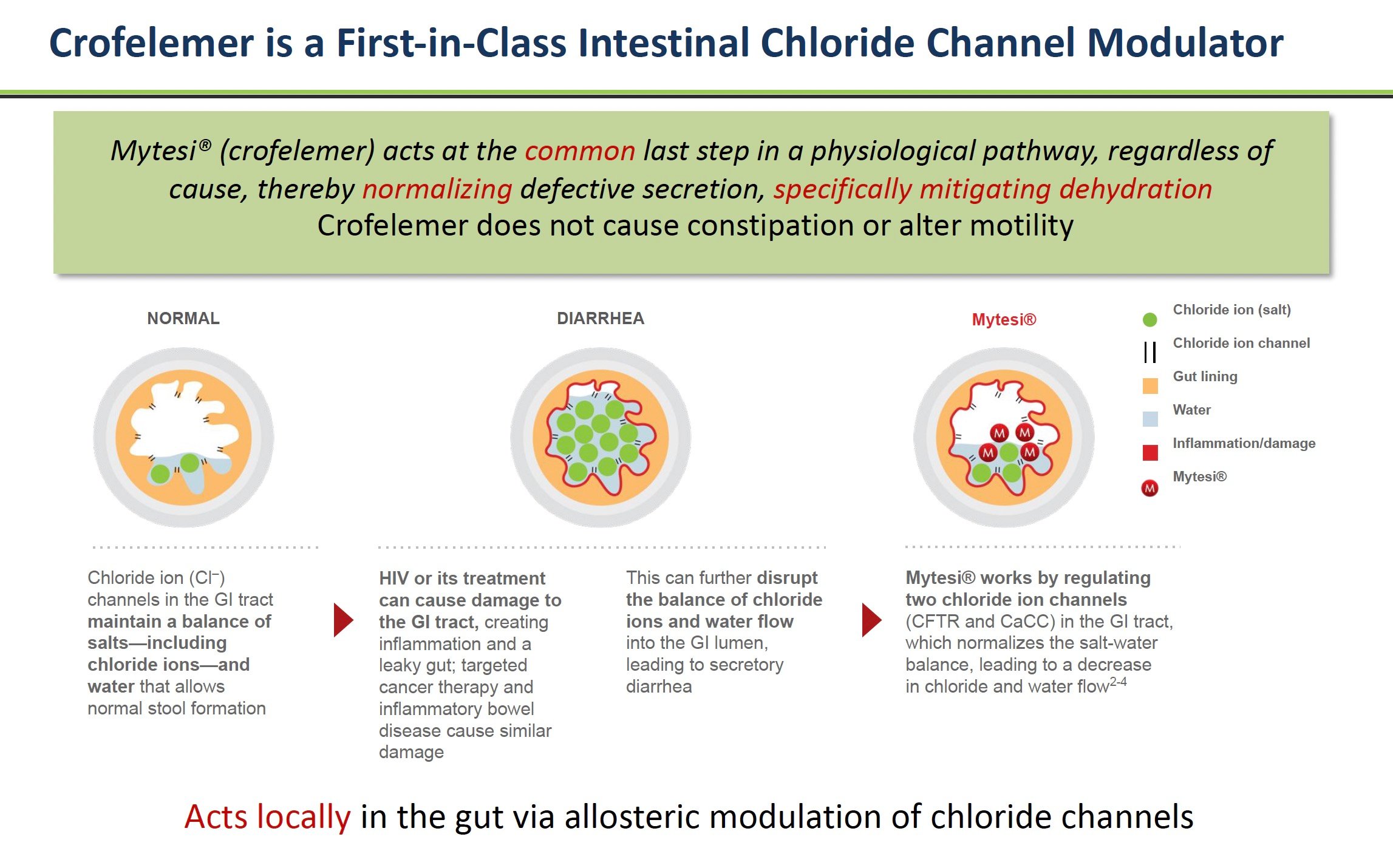
Source: Company Documents
This unique mechanism of action is vital because other antidiarrheal drugs, such as Imodium or loperamide, derived from opioids, work differently by slowing down gut motility. The unintended side-effect of reducing motility is that it can cause constipation. In contrast, crofelemer targets the root cause of secretory diarrhea to return patients to more normal GI function.
After being studied for decades, crofelemer was first approved by the FDA in 2012 to treat noninfectious diarrhea in adults with HIV/AIDS on antiretroviral therapy. Since then, crofelemer has been undergoing rigorous testing in clinical trials to evaluate the drug’s effectiveness for the treatment of diarrhea from other conditions like cancer therapy and rare diseases.
For example, a crofelemer drug called Canalevia-CA1 is now FDA-conditionally approved for the treatment of chemotherapy-induced diarrhea in dogs. Testing in dogs supports potential use in humans for this same indication. Crofelemer is also being studied in rare "orphan" diseases like short bowel syndrome (SBS) and microvillus inclusion disease (MVID) with intestinal failure – two devastating conditions that require patients to be dependent on parenteral (IV) nutrition.
By leveraging its unique mechanism of action normalizing fluid secretion, crofelemer may provide a broadly effective treatment for multiple chronic GI conditions beyond just the treatment of HIV-related diarrhea. More label expansions and partnerships could occur if ongoing studies demonstrate crofelemer's efficacy across additional gastrointestinal diseases.
About Mytesi - Mytesi (crofelemer) is an antidiarrheal indicated for the symptomatic relief of noninfectious diarrhea in adult patients with HIV/AIDS on antiretroviral therapy (ART). Mytesi is not indicated for the treatment of infectious diarrhea. Rule out infectious etiologies of diarrhea before starting Mytesi. If infectious etiologies are not considered, there is a risk that patients with infectious etiologies will not receive the appropriate therapy and their disease may worsen. In clinical studies, the most common adverse reactions occurring at a rate greater than placebo were upper respiratory tract infection (5.7%), bronchitis (3.9%), cough (3.5%), flatulence (3.1%), and increased bilirubin (3.1%). See full Prescribing Information at Mytesi.com. Crofelemer, the active ingredient in Mytesi, is a botanical (plant-based) drug extracted and purified from the red bark sap of the medicinal Croton lechleri tree in the Amazon rainforest. Napo has established a sustainable harvesting program for crofelemer to ensure a high degree of quality and ecological integrity.
Important Safety Information About Canalevia - For oral use in dogs only. Not for use in humans. Keep Canalevia-CA1 (crofelemer delayed-release tablets) in a secure location out of reach of children and other animals. Consult a physician in case of accidental ingestion by humans. Do not use in dogs that have a known hypersensitivity to crofelemer. Prior to using Canalevia-CA1, rule out infectious etiologies of diarrhea. Canalevia-CA1 is a conditionally approved drug indicated for the treatment of chemotherapy-induced diarrhea in dogs. The most common adverse reactions included decreased appetite, decreased activity, dehydration, abdominal pain, and vomiting. Caution: Federal law restricts this drug to use by or on the order of a licensed veterinarian. Use only as directed. It is a violation of Federal law to use this product other than as directed in the labeling. Conditionally approved by FDA pending a full demonstration of effectiveness under application number 141-552. See full Prescribing Information at Canalevia.com.
How Crofelemer Works

Crofelemer is a prescription medicine that comes from the sap of a tree sustainably harvested from the Amazon rainforest and works differently than other treatments for gastrointestinal (GI) problems like diarrhea.
With most chronic diarrhea, too much water flows into the GI tract. This action causes loose, watery stools as the extra fluid mixes in. Crofelemer helps normalize water secretion into the intestines.
Inside the lining of the intestines are tiny channels that control the flow of water and salts like chloride into the GI tract. In some diseases, these channels become hyperactive, allowing too much fluid to enter the intestines. This fluid imbalance results in watery diarrhea.
Crofelemer acts directly on two critical intestinal channels called CFTR and CaCC to reduce their hyperactivity. Crofelemer normalizes the amount of fluid secreted into the intestines by calming these overactive channels.
With less extra water flowing into the intestines, stools become more solid, and patients have fewer loose, watery bowel movements.
In contrast, other antidiarrheal drugs like Imodium and loperamide work by slowing down the GI tract. But this opioid approach can cause side effects such as constipation.
Crofelemer treats the root cause of secretory diarrhea – too much fluid secretion into the intestines. It acts locally in the GI tract, normalizing water flow through chloride channel modulation. And it is non-opioid, so it does not cause opioid side effects.
By targeting and modulating the specific chloride channels involved in excess intestinal fluid secretion, crofelemer can effectively reduce chronic diarrhea without slowing overall GI motility like opioids. This novel mechanism of action makes crofelemer well-suited for chronic use in conditions like HIV-associated diarrhea.
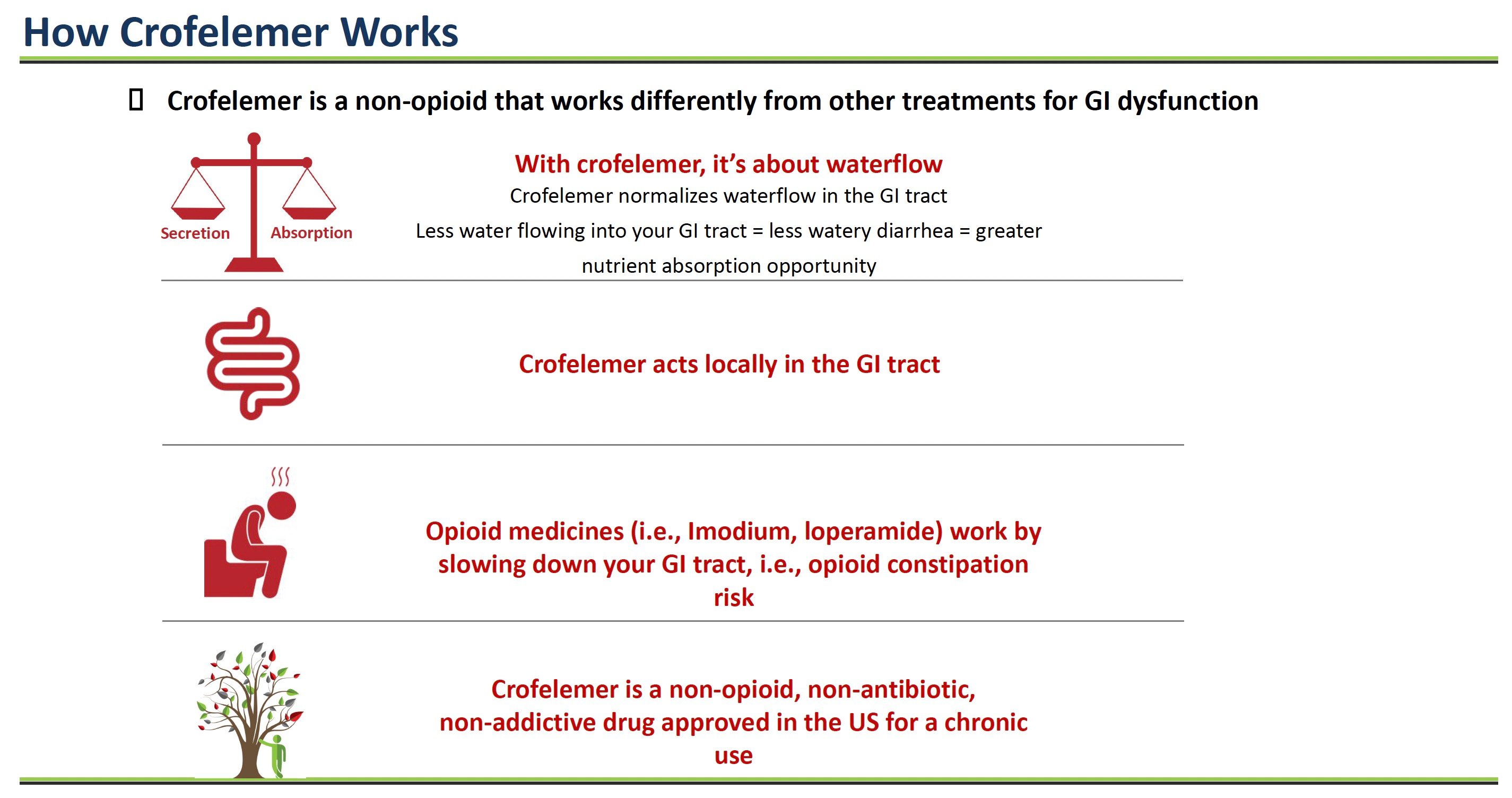
Source: Company Documents
About Mytesi - Mytesi (crofelemer) is an antidiarrheal indicated for the symptomatic relief of noninfectious diarrhea in adult patients with HIV/AIDS on antiretroviral therapy (ART). Mytesi is not indicated for the treatment of infectious diarrhea. Rule out infectious etiologies of diarrhea before starting Mytesi. If infectious etiologies are not considered, there is a risk that patients with infectious etiologies will not receive the appropriate therapy and their disease may worsen. In clinical studies, the most common adverse reactions occurring at a rate greater than placebo were upper respiratory tract infection (5.7%), bronchitis (3.9%), cough (3.5%), flatulence (3.1%), and increased bilirubin (3.1%). See full Prescribing Information at Mytesi.com. Crofelemer, the active ingredient in Mytesi, is a botanical (plant-based) drug extracted and purified from the red bark sap of the medicinal Croton lechleri tree in the Amazon rainforest. Napo has established a sustainable harvesting program for crofelemer to ensure a high degree of quality and ecological integrity.
Jaguar/Napo Product Portfolio – Crofelemer Pipeline

Jaguar Health is developing multiple formulations of its key product, crofelemer, to treat different gastrointestinal diseases. Crofelemer is a prescription drug derived from tree sap that modulates intestinal fluid secretion to alleviate diarrhea. Jaguar has an extensive development pipeline for crofelemer ranging from the initial preclinical research stage to an already approved product. The goal is to expand crofelemer's use across multiple chronic GI conditions.
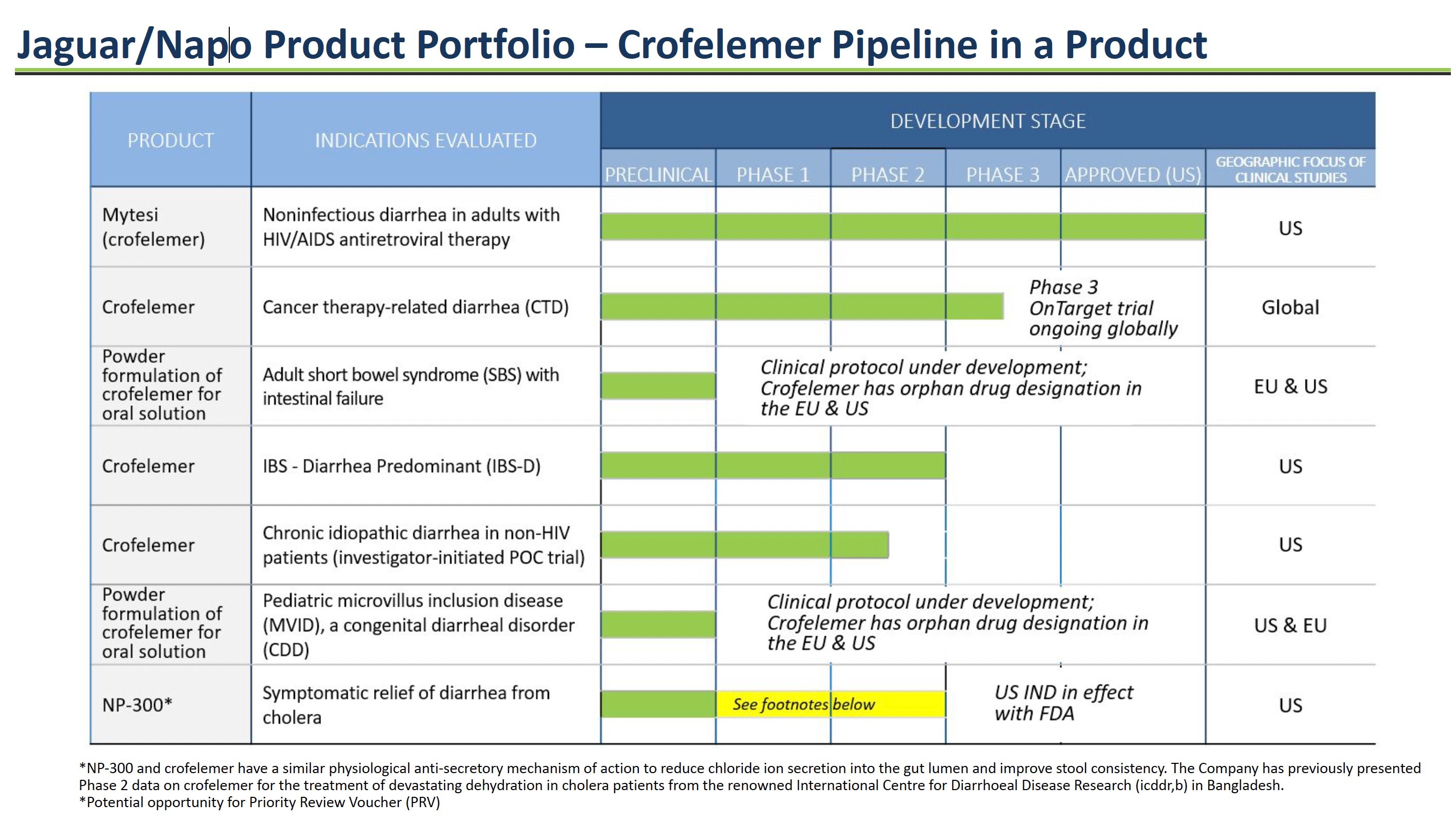
Source: Company Documents
Mytesi® for HIV-Related Diarrhea
Mytesi (crofelemer) is an FDA-approved drug for the treatment of noninfectious diarrhea in adults with HIV/AIDS on antiretroviral therapy. It normalizes fluid transport in the intestines to reduce chronic diarrhea. Mytesi was Jaguar's first approved crofelemer product, generating revenue since its launch in 2016.
Crofelemer for Cancer Therapy-related Diarrhea
Jaguar is conducting a Phase 3 clinical trial of crofelemer for cancer therapy-related diarrhea in patients receiving targeted therapies. These cancer agents often damage the gut lining, causing loose stools. Crofelemer could reduce this side effect.
Crofelemer Powder for Rare Orphan Diseases: Short Bowel Syndrome & Microvillus Inclusion Disease
A powder formulation of crofelemer is in development for short bowel syndrome (SBS) and microvillus inclusion disease (MVID) patients with intestinal failure who require IV nutrition. By modulating intestinal fluid, crofelemer may reduce chronic diarrhea in these patients. Orphan-drug incentives could support development. The FDA activated the company’s Investigational New Drug application for crofelemer for the treatment of MVID on August 7, 2023.
Crofelemer for Irritable Bowel Syndrome
Crofelemer has undergone clinical evaluation for patients with diarrhea-predominant IBS. Crofelemer may provide symptomatic relief for chronic loose, watery stools by controlling intestinal fluid secretion.
NP-300 for Cholera Diarrhea
NP-300 is a second-generation anti-secretory antidiarrheal in development for the relief and treatment of moderate-to-severe diarrhea from bacterial, viral, and parasitic infections, including Vibrio cholerae, the bacterium that causes cholera. In September 2023, the FDA activated the company’s Investigational New Drug (IND) application for NP-300 for crofelemer for this indication. NP-300 has a similar mechanism of action as crofelemer but is less costly to produce.
About Mytesi - Mytesi (crofelemer) is an antidiarrheal indicated for the symptomatic relief of noninfectious diarrhea in adult patients with HIV/AIDS on antiretroviral therapy (ART). Mytesi is not indicated for the treatment of infectious diarrhea. Rule out infectious etiologies of diarrhea before starting Mytesi. If infectious etiologies are not considered, there is a risk that patients with infectious etiologies will not receive the appropriate therapy and their disease may worsen. In clinical studies, the most common adverse reactions occurring at a rate greater than placebo were upper respiratory tract infection (5.7%), bronchitis (3.9%), cough (3.5%), flatulence (3.1%), and increased bilirubin (3.1%). See full Prescribing Information at Mytesi.com. Crofelemer, the active ingredient in Mytesi, is a botanical (plant-based) drug extracted and purified from the red bark sap of the medicinal Croton lechleri tree in the Amazon rainforest. Napo has established a sustainable harvesting program for crofelemer to ensure a high degree of quality and ecological integrity.
Videos – Jaguar Health: Improving Lives

Please watch the following videos for more information about Jaguar Health and how the company is working to improve lives.
-
From Tree to Bottle
-
December 2021 Discussion About CTD by Lee Schwartzberg, MD, FACP, Professor of Medicine, University of Tennessee Health Science Center, and Napo Pharmaceuticals Scientific Advisory Board (SAB) Member.
-
Lisa Conte Interview with Sandra M. Swain, MD, FACP, FASCO (member of Jaguar/Napo Scientific Advisory Board).
-
Lisa Conte Interview with Dr. Kelly Shanahan, a former clinician and a metastatic breast cancer patient who is now a full-time independent patient advocate and a member of the Jaguar/Napo Scientific Advisory Board.
Source: Company Documents
Global Market Growth Opportunities

Jaguar Health is pursuing a pipeline of crofelemer formulations that span from supportive care for overactive bowel – which includes symptoms such as chronic debilitating diarrhea, GI urgency, and GI incontinence – to potential disease-modifying products in areas of high unmet need. The company’s initiatives represent an expansion into higher-value markets with greater potential to impact patient outcomes and lower the cost of care. The global prescription and OTC gastrointestinal agent market alone is projected to reach $21 billion by 2025, presenting sizable commercial opportunities if Jaguar can successfully develop and differentiate its products.
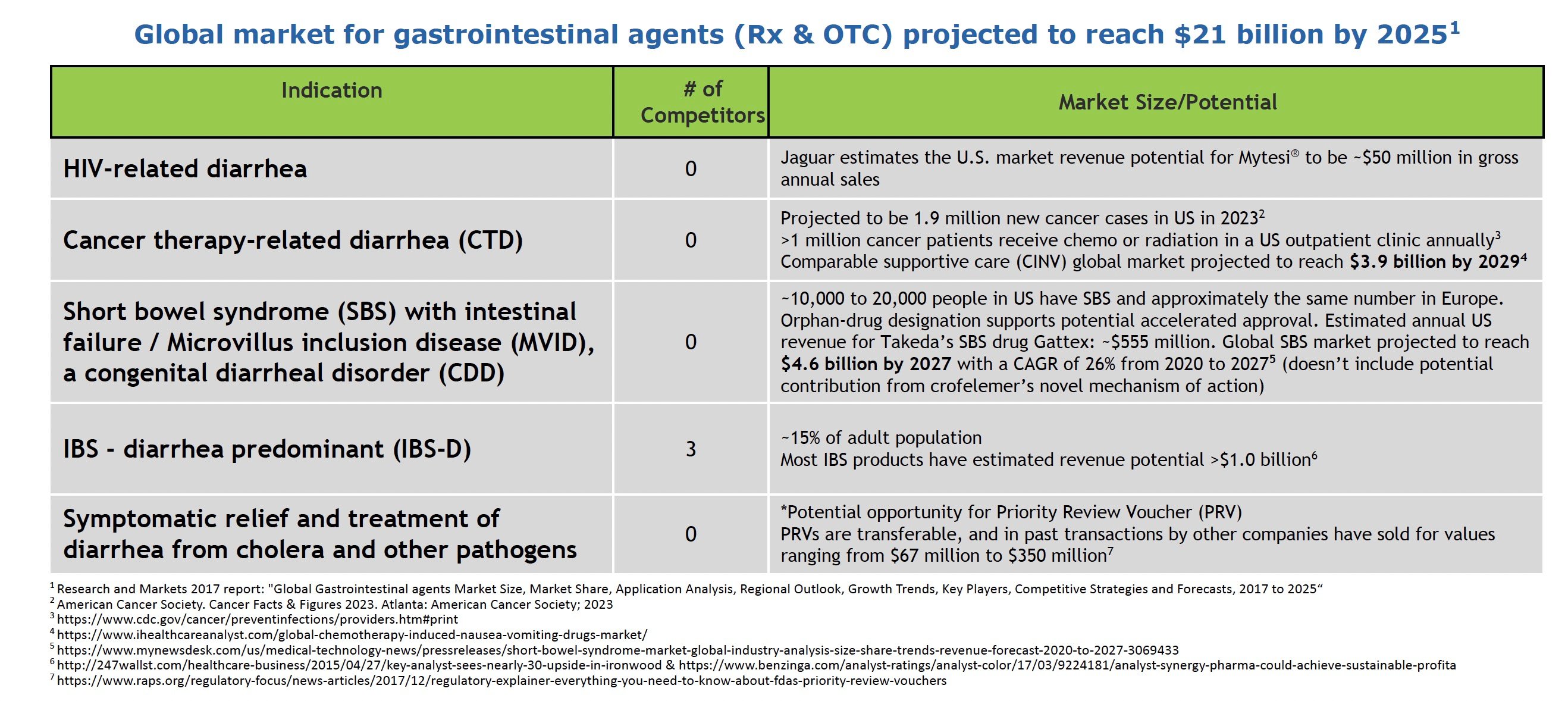
Source: Company Documents
In HIV-related diarrhea, Mytesi is the only FDA-approved treatment. About 70% of HIV/AIDS patients in the US are now over 50 and have lived with the virus for over ten years, often causing chronic gut complications that require symptomatic relief.
For cancer therapy-related diarrhea (CTD), 1.9 million new cancer cases were projected in the US for 2023. Up to 80% of chemotherapy patients experience diarrhea, requiring treatment delays/changes. By preventing CTD, crofelemer could support better adherence and outcomes. The global market for a comparable supportive care indication, chemotherapy-induced nausea and vomiting (CINV), is projected by market research firm iHealthcareAnalyst to reach a value of $3.9 billion by 2029
In short bowel syndrome (SBS) and congenital diarrheal disorders like microvillus inclusion disease (MVID), crofelemer may reduce dependence on parenteral nutrition. About 10,000-20,000 people in the US have SBS. MVID is an ultra-rare disease affecting a couple of hundred patients globally. The global SBS market alone is projected to grow to $4.6 billion by 2027, according to market research firm Vision Research Reports.
For diarrhea-predominant IBS, which impacts an estimated 15% of US adults, crofelemer would target the root cause of chronic watery diarrhea, unlike current treatments. Competitors have estimated peak US sales above $1 billion annually for drugs in this category. Effective relief of IBS-D symptoms remains a major unmet need.
Finally, in infectious diarrhea from pathogens like Vibrio cholerae, the company’s NP-300 drug product candidate may qualify for a Priority Review Voucher (PRV) from the FDA. PRVs are transferable and, in past transactions by other companies, have sold for values ranging from $67 million to $350 million. Additionally, it may meet a global need for affordable infection control in developing markets. In September 2023, the FDA activated the company’s Investigational New Drug (IND) application for NP-300 for crofelemer for this indication.
In summary, Jaguar Health's crofelemer pipeline spans high-value offerings in potential multi-billion-dollar markets where it can fill significant unmet needs related to diarrhea control and intestinal fluid regulation if successfully developed and commercialized.
About Mytesi - Mytesi (crofelemer) is an antidiarrheal indicated for the symptomatic relief of noninfectious diarrhea in adult patients with HIV/AIDS on antiretroviral therapy (ART). Mytesi is not indicated for the treatment of infectious diarrhea. Rule out infectious etiologies of diarrhea before starting Mytesi. If infectious etiologies are not considered, there is a risk that patients with infectious etiologies will not receive the appropriate therapy and their disease may worsen. In clinical studies, the most common adverse reactions occurring at a rate greater than placebo were upper respiratory tract infection (5.7%), bronchitis (3.9%), cough (3.5%), flatulence (3.1%), and increased bilirubin (3.1%). See full Prescribing Information at Mytesi.com. Crofelemer, the active ingredient in Mytesi, is a botanical (plant-based) drug extracted and purified from the red bark sap of the medicinal Croton lechleri tree in the Amazon rainforest. Napo has established a sustainable harvesting program for crofelemer to ensure a high degree of quality and ecological integrity.
2023 Critical Activities to Unlock Jaguar Health's Value Potential

Jaguar Health has laid out several important goals and targets for 2023 through 2024:
A major milestone will be the expected availability in late October 2023 of the primary endpoint data for Napo’s pivotal Phase 3 OnTarget trial of crofelemer for preventative treatment of chemotherapy-induced overactive bowel (CIOB) in adults with cancer on targeted therapy. The primary endpoint looks at the study's main goal – evaluating crofelemer's effectiveness in reducing diarrhea rates. Jaguar Health anticipates being able to present additional data from this pivotal trial data at a medical conference in December 2023.
An independent pilot phase 2 study of crofelemer for the management of neratinib-associated diarrhea in patients with HER2+ early-stage breast cancer indicates that crofelemer, Napo’s FDA-approved drug, may be effective for the management of neratinib-induced diarrhea. The results of the study, which was designed by the study's principal investigator, Jo Chien, MD, and published in the peer-reviewed journal Clinical Breast Cancer, are consistent with the results of a preclinical dog study evaluating the effects of crofelemer in improving diarrhea associated with neratinib, a tyrosine kinase inhibitor (TKI), presented at the American Association for Cancer Research Virtual Annual Meeting II in June 2020.
Jaguar Health's pipeline includes pursuing crofelemer for short bowel syndrome (SBS) and congenital diarrheal disorders (CDD), which both qualify as rare diseases.
Source: Company Documents
Jaguar Health is supporting proof-of-concept clinical trials of crofelemer conducted by independent investigators for SBS and CDD. Proof-of-concept trials can provide early evidence that a drug may be effective. Jaguar Health expects that results from SBS and CDD proof-of-concept studies will be available before the end of 2023 in the first half of 2024.
The company believes the SBS and CDD proof-of-concept data could support expanded patient access to crofelemer through early access programs in specific European countries starting as early as 2024. Early access programs allow patients to receive a medicine before it is fully approved and can generate revenue while also allowing faster access for patients with serious diseases.
Also, in the second half of 2023, Jaguar Health expects the results of a canine study they completed evaluating crofelemer for preventing chemotherapy-related diarrhea in dogs to be published. This canine data could further support crofelemer's use for managing diarrhea from cancer treatments in humans.
Jaguar Health is targeting business development partnerships related to its pipeline and global commercialization efforts in 2023. Partnerships with other companies can help extend crofelemer's reach by licensing rights in certain geographies and disease areas.
Jaguar Health’s major clinical trial readouts, publications, and regulatory milestones spanning multiple programs slated for 2023-2024 all bode well for the company. Meeting these ambitious goals could significantly advance crofelemer toward approvals in cancer therapy-related diarrhea, SBS, and CDD while also expanding real-world evidence and patient access. Jaguar Health aims to execute new partnerships to extend commercial reach globally. Delivering on these key milestones will be critical for Jaguar Health's value and future growth potential.
About Mytesi - Mytesi (crofelemer) is an antidiarrheal indicated for the symptomatic relief of noninfectious diarrhea in adult patients with HIV/AIDS on antiretroviral therapy (ART). Mytesi is not indicated for the treatment of infectious diarrhea. Rule out infectious etiologies of diarrhea before starting Mytesi. If infectious etiologies are not considered, there is a risk that patients with infectious etiologies will not receive the appropriate therapy and their disease may worsen. In clinical studies, the most common adverse reactions occurring at a rate greater than placebo were upper respiratory tract infection (5.7%), bronchitis (3.9%), cough (3.5%), flatulence (3.1%), and increased bilirubin (3.1%). See full Prescribing Information at Mytesi.com. Crofelemer, the active ingredient in Mytesi, is a botanical (plant-based) drug extracted and purified from the red bark sap of the medicinal Croton lechleri tree in the Amazon rainforest. Napo has established a sustainable harvesting program for crofelemer to ensure a high degree of quality and ecological integrity.
Important Safety Information About Canalevia - For oral use in dogs only. Not for use in humans. Keep Canalevia-CA1 (crofelemer delayed-release tablets) in a secure location out of reach of children and other animals. Consult a physician in case of accidental ingestion by humans. Do not use in dogs that have a known hypersensitivity to crofelemer. Prior to using Canalevia-CA1, rule out infectious etiologies of diarrhea. Canalevia-CA1 is a conditionally approved drug indicated for the treatment of chemotherapy-induced diarrhea in dogs. The most common adverse reactions included decreased appetite, decreased activity, dehydration, abdominal pain, and vomiting. Caution: Federal law restricts this drug to use by or on the order of a licensed veterinarian. Use only as directed. It is a violation of Federal law to use this product other than as directed in the labeling. Conditionally approved by FDA pending a full demonstration of effectiveness under application number 141-552. See full Prescribing Information at Canalevia.com.
Commercial Rights and Partnerships

Source: Company Documents
Jaguar Health holds global commercial rights to Mytesi® (crofelemer), its FDA-approved drug for the symptomatic relief of noninfectious diarrhea in adults with HIV/AIDS on antiretroviral therapy. Jaguar also holds global rights to developing and commercializing crofelemer for multiple possible follow-on indications, including cancer therapy-related diarrhea.
In the animal health area, Jaguar holds the global rights to Canalevia®-CA1, its oral prescription drug FDA conditionally approved for the treatment of chemotherapy-induced diarrhea (CID) in dogs. Jaguar is focused on commercializing Canalevia-CA1 for CID in dogs in the United States.
In Europe, Jaguar has licensed the rights to crofelemer for short bowel syndrome, congenital diarrheal disorders, and HIV-related diarrhea to Jaguar family company Napo Therapeutics. This initiative provides Napo Therapeutics the exclusive rights to develop and commercialize crofelemer in Europe for these indications.
Additionally, Jaguar has partnered with Quadri Pharma for the potential commercialization of Mytesi in select countries in the Middle East and North Africa region. Quadri Pharma has exclusive promotional, distribution, and commercialization rights for Mytesi in these territories, following any necessary regulatory approvals.
Jaguar also has an agreement with Knight Therapeutics for the potential commercialization of Mytesi and other Jaguar prescription products in Canada and Israel. Knight holds exclusive distribution and commercialization rights in these territories.
Overall, Jaguar retains global rights to Mytesi, Canalevia-CA1, and the crofelemer pipeline while also retaining the ability to execute select partnerships to extend commercialization in key international markets. The company’s partnerships give Jaguar control over its core assets while leveraging partners to maximize the global value of its products.
About Mytesi - Mytesi (crofelemer) is an antidiarrheal indicated for the symptomatic relief of noninfectious diarrhea in adult patients with HIV/AIDS on antiretroviral therapy (ART). Mytesi is not indicated for the treatment of infectious diarrhea. Rule out infectious etiologies of diarrhea before starting Mytesi. If infectious etiologies are not considered, there is a risk that patients with infectious etiologies will not receive the appropriate therapy and their disease may worsen. In clinical studies, the most common adverse reactions occurring at a rate greater than placebo were upper respiratory tract infection (5.7%), bronchitis (3.9%), cough (3.5%), flatulence (3.1%), and increased bilirubin (3.1%). See full Prescribing Information at Mytesi.com. Crofelemer, the active ingredient in Mytesi, is a botanical (plant-based) drug extracted and purified from the red bark sap of the medicinal Croton lechleri tree in the Amazon rainforest. Napo has established a sustainable harvesting program for crofelemer to ensure a high degree of quality and ecological integrity.
Important Safety Information About Canalevia - For oral use in dogs only. Not for use in humans. Keep Canalevia-CA1 (crofelemer delayed-release tablets) in a secure location out of reach of children and other animals. Consult a physician in case of accidental ingestion by humans. Do not use in dogs that have a known hypersensitivity to crofelemer. Prior to using Canalevia-CA1, rule out infectious etiologies of diarrhea. Canalevia-CA1 is a conditionally approved drug indicated for the treatment of chemotherapy-induced diarrhea in dogs. The most common adverse reactions included decreased appetite, decreased activity, dehydration, abdominal pain, and vomiting. Caution: Federal law restricts this drug to use by or on the order of a licensed veterinarian. Use only as directed. It is a violation of Federal law to use this product other than as directed in the labeling. Conditionally approved by FDA pending a full demonstration of effectiveness under application number 141-552. See full Prescribing Information at Canalevia.com.
Jaguar and Magdalena Biosciences Collaboration

Source: Company Documents
Beyond its core focus, Jaguar Health has invested in an intriguing new venture targeting mental health disorders through natural plant-based prescription drugs. This initiative, known as the Entheogen Therapeutics Initiative (ETI), exemplifies Jaguar Health's long-term vision to leverage its extensive knowledge of ethnobotanical plant medicine to develop innovative therapies across various disease areas.
The ETI is centered around exploring plants with potential mental health benefits, with an initial focus on discovering treatments for depression. This novel program aligns with Jaguar Health's mission to sustainably develop first-in-class medicines from rainforest plants through collaborations with indigenous communities. Jaguar Health's recent formation of the joint venture Magdalena Biosciences crystallizes the ETI strategy into a concrete drug development vehicle targeting major mental health needs.
Origins of Jaguar Health's Mental Health Focus
Jaguar Health's interest in expanding into mental health traces back to the experience of its management team members at the company's predecessor, Shaman Pharmaceuticals. In the 1990s, Shaman conducted extensive global ethnobotanical research, yielding a library of over 2,300 medicinal plants used in traditional healing systems. The team's field studies in Nigeria investigated Native African plants like Picralima nitida, which traditional healers have used to treat psychotic disorders.
When Jaguar Health acquired this plant library from the bankruptcy of Shaman in 2001, it gained a unique asset bridging indigenous medicine and Western pharmaceutical science. Jaguar Health has continued to build upon this library through additional rainforest research. Hence, Jaguar Health possesses unparalleled knowledge of medicinal plants, including many with potential but unexplored effects on the mind and mental health.
The Entheogen Therapeutics Initiative
Building upon this foundation, in 2021, Jaguar Health launched the Entheogen Therapeutics Initiative to formally pursue drug candidates from psychoactive plants for various mental health indications. The term "entheogen" refers to plants that induce spiritual or mystical experiences, many of which have traditional ceremonial uses. Jaguar Health's ETI goes beyond exploring recreational uses, focusing instead on developing rigorously tested prescription drugs for specific medical needs.
The ETI is advised by a Scientific Strategy Team of leading ethnobotanists, physicians, and pharmacologists, including several experts involved in the original Shaman library of plants. This team's knowledge of plant-based medicine and connections with indigenous communities is invaluable for identifying promising new drug candidates. Jaguar Health also chairs an ETI Ethics Board to ensure activities adhere to ethical standards regarding traditional knowledge and fair benefit-sharing.
Initially, the ETI is targeting the discovery of plant-based treatments for mood disorders like depression, anxiety, and PTSD. Depression, in particular, represents a significant unmet medical need, with over 21 million Americans affected each year. Existing antidepressant drugs like SSRIs have limitations in efficacy and side effects, creating demand for new therapeutic approaches. Plants offer a rich starting point for psychiatric drug discovery, given their long use in traditional healing systems.
The ETI has already pinpointed lead compounds from Jaguar Health's library for further investigation. One example is alstonine, a compound derived from the Picralima nitida plant used by traditional healers in Nigeria to treat psychiatric conditions. While still early stage, alstonine could provide a novel treatment mechanism compared to existing antidepressant drugs.
Formation of Magdalena Biosciences Joint Venture
To accelerate ETI's long-term mission, Jaguar Health recently established an exciting joint venture called Magdalena Biosciences, focused specifically on developing plant-based drugs for mental health disorders. Formed in January 2023 in partnership with the Canadian company Filament Health and with backing from One Small Planet, Magdalena Biosciences represents a milestone in Jaguar Health's bold push into mental health.
Magdalena Biosciences is leveraging Jaguar Health's extensive plant library along with Filament Health's drug development expertise. The joint venture has an exclusive license to evaluate plants and extracts from Jaguar Health's collection for specified mental health indications.
The first goal is to identify and optimize plants that may have promise for treating adult ADHD. ADHD is a common disorder affecting over 10 million adults in the U.S., yet existing stimulant treatments have misuse potential. Non-stimulant drugs are limited, creating an opportunity for plant-based alternative prescription drugs with new mechanisms of action and improved safety profiles.
In the future, Magdalena Biosciences plans to pursue additional mood disorders like anxiety, depression, and PTSD. The ultimate vision is to partner with pharmaceutical companies to fully develop and commercialize the venture's botanical drug candidates.
Jaguar Health owns approximately 40% of Magdalena Biosciences, initially valued at $5 million based on One Small Planet's seed investment of $1 million. This ownership stake provides Jaguar Health equity participation in Magdalena Biosciences' long-term success. Jaguar Health also benefits near-term from the $1 million infusion into its plant library and ethnobotanical expertise.
Strategic Context and Implications
Jaguar Health's pursuit of plant-based mental health drugs represents a bold long-term diversification, leveraging the company's unparalleled botanical knowledge and a large library of plants with potential medicinal benefits into new disease areas beyond core gastrointestinal indications. The ETI and Magdalena Biosciences joint venture strategically expands Jaguar Health's pipeline, targeting major conditions like mood disorders and ADHD, which affect millions of patients globally.
The ETI focuses on natural plant compounds that differentiate Jaguar Health's drug candidates from conventional synthetic psychiatric medications. These new drugs may offer improved efficacy, safety, and abuse potential profiles that drive adoption. Additionally, the basis of traditional plant medicine aligns with growing consumer interest in natural remedies over conventional medicines.
Of course, Jaguar Health faces formidable obstacles in proving the safety and efficacy of complex botanical drugs for mental illness. Clinical development timelines are lengthy, costs substantial, and failure rates high. But Jaguar Health is taking a prudent long-term approach through the ETI and Magdalena Biosciences, leveraging its unparalleled experience in ethnobotanical drug discovery.
If ultimately successful, Jaguar Health's novel plant-based therapies could transform the treatment of depression, ADHD, and other psychiatric conditions. This effort would enable Jaguar Health to tap into a multibillion-dollar market and drive significant shareholder value. In the nearer term, the ETI and the Magdalena Biosciences joint venture expand Jaguar Health's portfolio pipeline beyond gastrointestinal medicine, mitigating risk through therapeutic diversification.
Overall, the promise of plant-based mental health prescription drugs makes this an intriguing, if still highly speculative, new frontier for Jaguar Health, warranting close monitoring in the years ahead.
Financial Summary

Jaguar Health, Inc. (NASDAQ: JAGX) is a commercial-stage pharmaceuticals company focused on developing novel proprietary prescription medicines sustainably derived from plants from rainforest areas for people and animals with GI distress, specifically overactive bowel, which includes symptoms such as chronic debilitating diarrhea, GI urgency, and GI incontinence.
In 2022, Jaguar reported total revenues of $12 million, a significant 175.8% increase compared to revenues of $4.3 million in 2021. The revenue growth was primarily driven by increased sales of their human drug Mytesi® for symptomatic relief of noninfectious diarrhea in HIV/AIDS patients. This growth reflects the company's transition from a wholesaler distribution model to distribution through specialty pharmacies, resulting in lower discounts, rebates, and fees than the prior year. Jaguar also launched sales of their new animal drug Canalevia®-CA1 for chemotherapy-induced diarrhea in dogs in 2022, generating $167,000 in initial revenues.
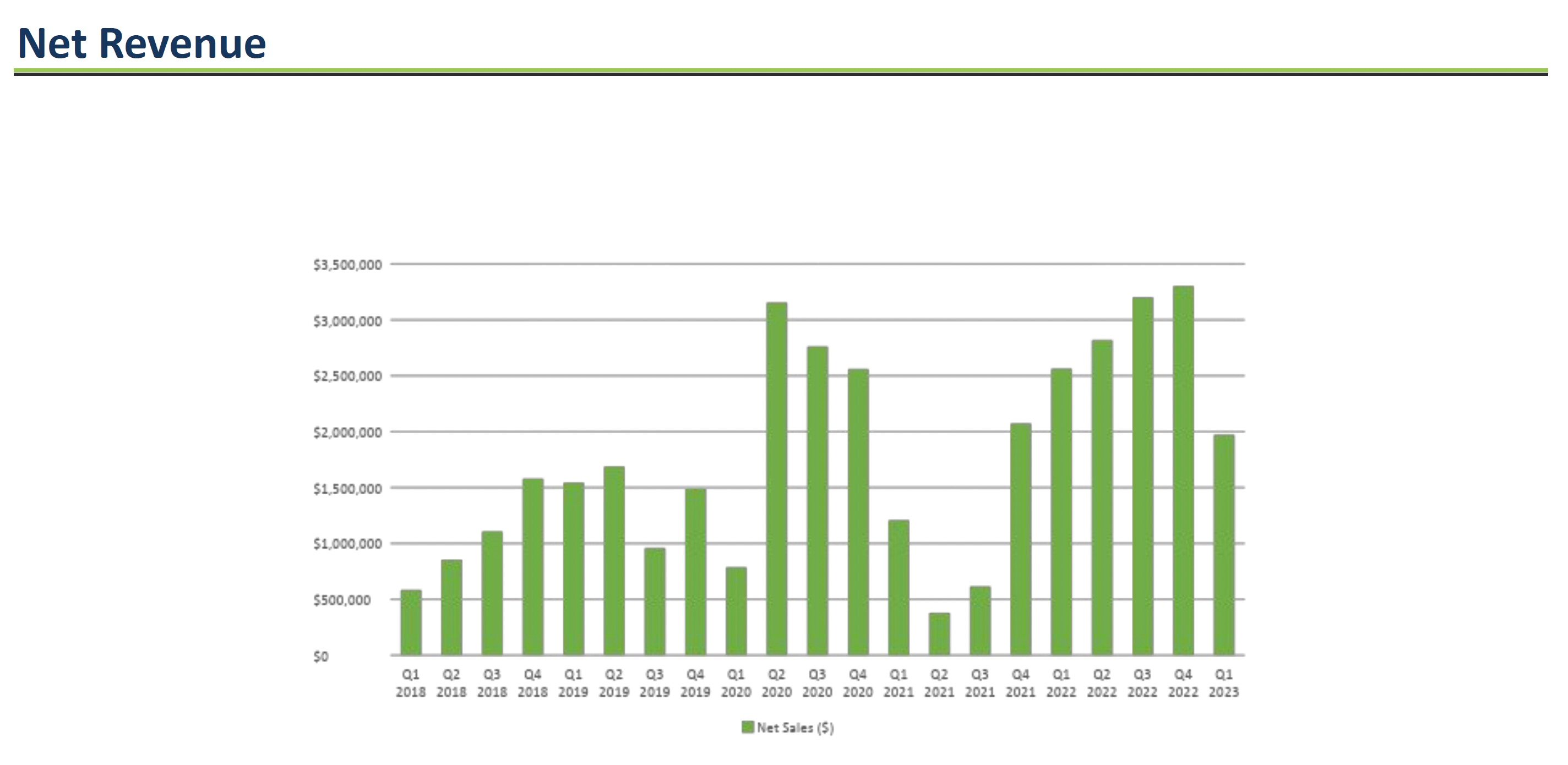
Source: Company Documents
Despite strong revenue growth, Jaguar continued to report net losses in 2022 of $48.4 million, although this was an 8% improvement from net losses of $52.6 million in 2021. The losses are attributed to high operating expenses related to R&D for Jaguar's pipeline programs, including crofelemer for cancer therapy-related diarrhea and commercialization activities for Mytesi and Canalevia-CA1. Key expense items in 2022 included R&D expenses of $17.6 million, sales and marketing expenses of $8.8 million, and G&A expenses of $17.9 million.
Jaguar is progressing with developing crofelemer for additional indications beyond HIV-related diarrhea, including chemotherapy-induced overactive bowel (CIOB) and inflammatory bowel diseases. Crofelemer is the subject of the OnTarget study, Napo’s ongoing pivotal Phase 3 clinical trial for preventative treatment of CIOB in adults with cancer. Top-line data for the primary endpoint from this trial is expected at the end of October 2023.
The company has received orphan drug designations from the FDA and EMA for crofelemer for two rare diseases: short bowel syndrome (SBS) and microvillus inclusion disease (MVID, a congenital diarrheal disorder (CDD). Jaguar is supporting third-party investigational proof-of-concept studies of crofelemer for these indications that could enable early patient access in Europe, possibly in 2024. Further pipeline programs include NP-300, a second-generation anti-secretory agent for the treatment of moderate-to-severe diarrhea from bacterial, viral, and parasitic infections, including Vibrio cholerae, the bacterium that causes cholera. In September 2023, the FDA activated the company’s Investigational New Drug (IND) application for NP-300 for crofelemer for this indication. NP-300 has a similar mechanism of action as crofelemer but is less costly to produce. Jaguar also formed a joint venture in 2023 with Filament Health, called Magdalena Biosciences, to develop novel plant-based drugs for mental health indications, including ADHD, depression, and anxiety.
In animal health, Jaguar now markets Canalevia-CA1 for the treatment of chemotherapy-induced diarrhea in dogs under FDA conditional approval.
For long-term investors, Jaguar Health represents an early-stage biopharma with high-risk but potentially high reward as it aims to establish a differentiated pipeline of first-in-class plant-based medicines.
About Mytesi - Mytesi (crofelemer) is an antidiarrheal indicated for the symptomatic relief of noninfectious diarrhea in adult patients with HIV/AIDS on antiretroviral therapy (ART). Mytesi is not indicated for the treatment of infectious diarrhea. Rule out infectious etiologies of diarrhea before starting Mytesi. If infectious etiologies are not considered, there is a risk that patients with infectious etiologies will not receive the appropriate therapy and their disease may worsen. In clinical studies, the most common adverse reactions occurring at a rate greater than placebo were upper respiratory tract infection (5.7%), bronchitis (3.9%), cough (3.5%), flatulence (3.1%), and increased bilirubin (3.1%). See full Prescribing Information at Mytesi.com. Crofelemer, the active ingredient in Mytesi, is a botanical (plant-based) drug extracted and purified from the red bark sap of the medicinal Croton lechleri tree in the Amazon rainforest. Napo has established a sustainable harvesting program for crofelemer to ensure a high degree of quality and ecological integrity.
Important Safety Information About Canalevia - For oral use in dogs only. Not for use in humans. Keep Canalevia-CA1 (crofelemer delayed-release tablets) in a secure location out of reach of children and other animals. Consult a physician in case of accidental ingestion by humans. Do not use in dogs that have a known hypersensitivity to crofelemer. Prior to using Canalevia-CA1, rule out infectious etiologies of diarrhea. Canalevia-CA1 is a conditionally approved drug indicated for the treatment of chemotherapy-induced diarrhea in dogs. The most common adverse reactions included decreased appetite, decreased activity, dehydration, abdominal pain, and vomiting. Caution: Federal law restricts this drug to use by or on the order of a licensed veterinarian. Use only as directed. It is a violation of Federal law to use this product other than as directed in the labeling. Conditionally approved by FDA pending a full demonstration of effectiveness under application number 141-552. See full Prescribing Information at Canalevia.com.
Analyst Coverage

Jaguar Health is followed by several seasoned biopharma analysts at leading investment banks and research boutiques. This sell-side coverage provides important visibility and insights on Jaguar Health to the institutional investment community.

Source: Company Documents
A Deep and Seasoned Leadership Team

Jaguar Health has assembled an experienced leadership team with decades of combined expertise across pharmaceutical R&D, clinical development, manufacturing, business development, commercialization, legal, and financial operations.
The management team is led by Lisa Conte, the company's founder, president, and CEO, who has over 30 years of experience pioneering plant-based prescription medicines. Other key executives include Pravin Chaturvedi, Ph.D., the company’s Chief Scientific Officer and Chair of the Scientific Advisory Board, and Chief Medical Officer Dr. Darlene Horton, who has over 25 years of experience overseeing clinical development in the biopharma industry. This seasoned leadership team provides Jaguar Health with the strategic vision and operational capabilities to advance the company's pipeline of novel plant-based therapies.
Source: Company Documents
Lisa Conte is the founder, president, and chief executive officer, and a member of the board of directors of Jaguar Health, a commercial-stage pharmaceuticals company committed to discovering, developing, and commercializing plant-based prescription medicines for urgent global health needs. In July 2017, two companies founded by Ms. Conte—Napo Pharmaceuticals, a human-focused pharmaceuticals company, and Jaguar Animal Health, the veterinary-focused licensor of all of Napo’s technology—merged and now comprise Jaguar Health. In 1989, Ms. Conte founded Shaman Pharmaceutical and pioneered plant-based prescription medicine investigation and development for more than 30 years. Ms. Conte is a member of the board of directors of Healing Forest Conservatory, serves on the Editorial Advisory Board of Life Science Leader magazine, and serves on the Leadership Council of Pure Earth. She holds an MS in Physiology and Pharmacology from the University of California, San Diego, and an MBA and AB in Biochemistry from Dartmouth College.
Steven King, Ph.D., has served as Chief of Sustainable Supply, Ethnobotanical Research, and Intellectual Property since 2020. He joined the company in 2002 as Senior Vice President of Sustainable Supply, Ethnobotanical Research, and IP. Before that, he was Vice President of Ethnobotany and Conservation at Shaman Pharmaceuticals. He has a Ph.D. in Biology from the Institute of Economic Botany at the New York Botanical Garden and City University of New York and an MS in Biology from the same institutions.
Pravin Chaturvedi, Ph.D., has been Chief Scientific Officer since 2022 and serves as Chair of the Scientific Advisory Board. He has over 30 years of experience in the pharmaceutical industry and has participated in developing multiple approved drugs. He was previously President and CSO of Napo from 2006-2013. He co-founded several biotech companies, including Scion Pharmaceuticals, IndUS Pharmaceuticals, and Oceanyx Pharmaceuticals. He has a Ph.D. in Pharmaceutical Sciences from West Virginia University and a Bachelor's in Pharmacy from the University of Bombay.
Carol R. Lizak has been Chief Financial Officer since 2021. She joined the company in 2019 as Vice President of Finance and Corporate Controller and was promoted to Chief Accounting Officer and then Senior Vice President of Finance before becoming CFO. She has over 20 years of finance experience, including roles at Zosano Pharma, Quantum Secure, Alexza Pharmaceuticals, and HID Global. She holds an MBA from Pepperdine University Graziadio School of Business and Management and a BS in Business Administration from the University of Santo Tomas.
Karen J. Brunke, Ph.D., brings to Jaguar over 30 years of scientific, operational, clinical, senior executive, and corporate development experience in both large and small biotechnology companies. Dr. Brunke has been primarily responsible for negotiating multiple partnerships and licenses in business and corporate development. Dr. Brunke received her BA degree in Biochemistry and a Ph.D. in Microbiology from the University of Pennsylvania.
Darlene Horton, MD, brings over 25 years of clinical research and development, medical affairs, senior executive, and consulting experience in developing investigational and commercialized biopharmaceutical and drug-device combination products. She has extensive clinical development experience in multiple therapeutic areas. Before joining Napo Pharmaceuticals, she led clinical development and regulatory strategy as CMO at Coherus Biosciences, Itero Biopharmaceuticals, and SMC Biotechnology. Dr. Horton completed her Pediatric Cardiology fellowship and Pediatrics Residency at UCSF. She earned an MD and BS in Microbiology from the University of Florida.
David Sesin, Ph.D., is a pharmaceutical scientist with more than 30 years of experience, from drug discovery to manufacturing. Before serving as Jaguar’s CMO, he was Director of Chemistry and QHSE at Bayer CropScience and Director of Chemistry at AgraQuest, Inc. he spent nine years with Shaman Pharmaceuticals. Dr. Sesin holds a Ph.D. from the University of Utah.
Jonathan S. Wolin, JD, has been Chief of Staff and General Counsel since 2019. Before being promoted, he joined the company in 2018 as Chief Compliance Officer and Corporate Counsel. Previously he was an independent consultant, Chief Administrative Officer at Braden Partners, and Chief Compliance Officer at Natera and Braden Partners, among other roles. He holds a JD from The Catholic University of America Columbus School of Law, an MBA from The George Washington University School of Business, and a BS in Accounting from the University of Maryland
Ian Wendt has been Chief Commercial Officer since 2020 after joining as VP of Commercial Strategy in 2019. He has over 15 years of experience in pharmaceutical and biotech sales, marketing, and operations at companies including Gilead Sciences, Boehringer Ingelheim, and Roxane Laboratories. He has an MBA from Dalhousie University in Nova Scotia and a BSc from Acadia University.
SEC Filings
Financials
Risks & Disclosures

This communication is neither an offer to sell nor a solicitation of an offer to buy, nor a recommendation of any securities of the company mentioned herein.
OS Therapies, Inc. (the “Company”) has reviewed the content of this page as well as the accompanying presentation (“Company Presentation”) displayed on this page. To the best of its knowledge, the Company does not believe this content to be misleading or inaccurate in any material respect, nor does it believe there are any material omissions with respect to such content. The Company does not believe the contents of the page or the Company Presentation to contain any non-public material information.
Information and opinions presented in the Company Presentation are provided by the Company, and B2i Digital makes no representation as to their accuracy or completeness. The information contained on this page is not intended to constitute any form of advice, and the information provided is not intended to provide a sufficient basis on which to make an investment decision. It is not investment research, nor does it constitute a research recommendation, as it does not constitute substantive research or analysis. This information is not to be relied upon in substitution for the exercise of independent judgment.
Information, opinions and estimates contained on this page or in the Company Presentation reflect judgments by the Company as of the original date of publication by the Company and are subject to change without notice. Past performance should not be taken as an indication or guarantee of future performance, and no representation or warranty, express or implied is made regarding future performance.
A complete description of the risks and uncertainties relating to the Company and its securities can be found in the company's filings with the U.S. Securities and Exchange Commission available for free at www.sec.gov.
Information on this page may relate to penny stocks, which may also be referred to as low-priced stocks. Penny stocks are low-priced shares typically issued by small companies. Penny stocks involve greater than normal risk, they may be less liquid than other stocks (i.e., more difficult to sell), and there may be less reliable information available regarding such stocks. Investors in penny stocks should be prepared for the possibility that they may lose their entire investment.
B2i digital or its related entities may own securities of the Company.
The Company is a client of B2i Digital. The Company agreed to pay B2i Digital no greater than $100,000 in cash for 12 months of digital marketing consulting and investor awareness services.
This communication includes forward-looking statements that involve risks, uncertainties and assumptions that are difficult to predict. Words and expressions reflecting optimism, satisfaction or disappointment with current prospects, as well as words such as “believes,” “hopes,” “intends,” “estimates,” “expects,” “projects,” “plans,” “anticipates” and variations thereof, or the use of future tense, identify forward-looking statements, but their absence does not mean that a statement is not forward-looking. The Company’s forward-looking statements are not guarantees of performance, and actual results could vary materially from those contained in or expressed by such statements due to risks, uncertainties and other factors. The Company urges readers to consider specifically the various risk factors identified in its most recent Form 10-K, and any risk factors or cautionary statements included in any subsequent Form 10-Q or Form 8-K, filed with the SEC. Readers are cautioned not to place undue reliance on these forward-looking statements, which speak only as of the date of this communion. Except as required by law, the Company does not undertake any responsibility to update any forward-looking statements to take into account events or circumstances that occur after the date of this communication.
The OS Therapies management and investor relations team are available to talk to current and potential investors. They're happy to answer your questions and tell you what makes their story unique. Please fill out this form, and we will connect you shortly.
• Directly hear the OS Therapies story
• Ask your questions
• Submit the form below, and someone will get in touch with you as soon as possible
Note: Company management or its representative can only discuss and disclose information that is already available in the public domain. They will do their best to clarify such information to the extent permitted by securities law and industry regulations.








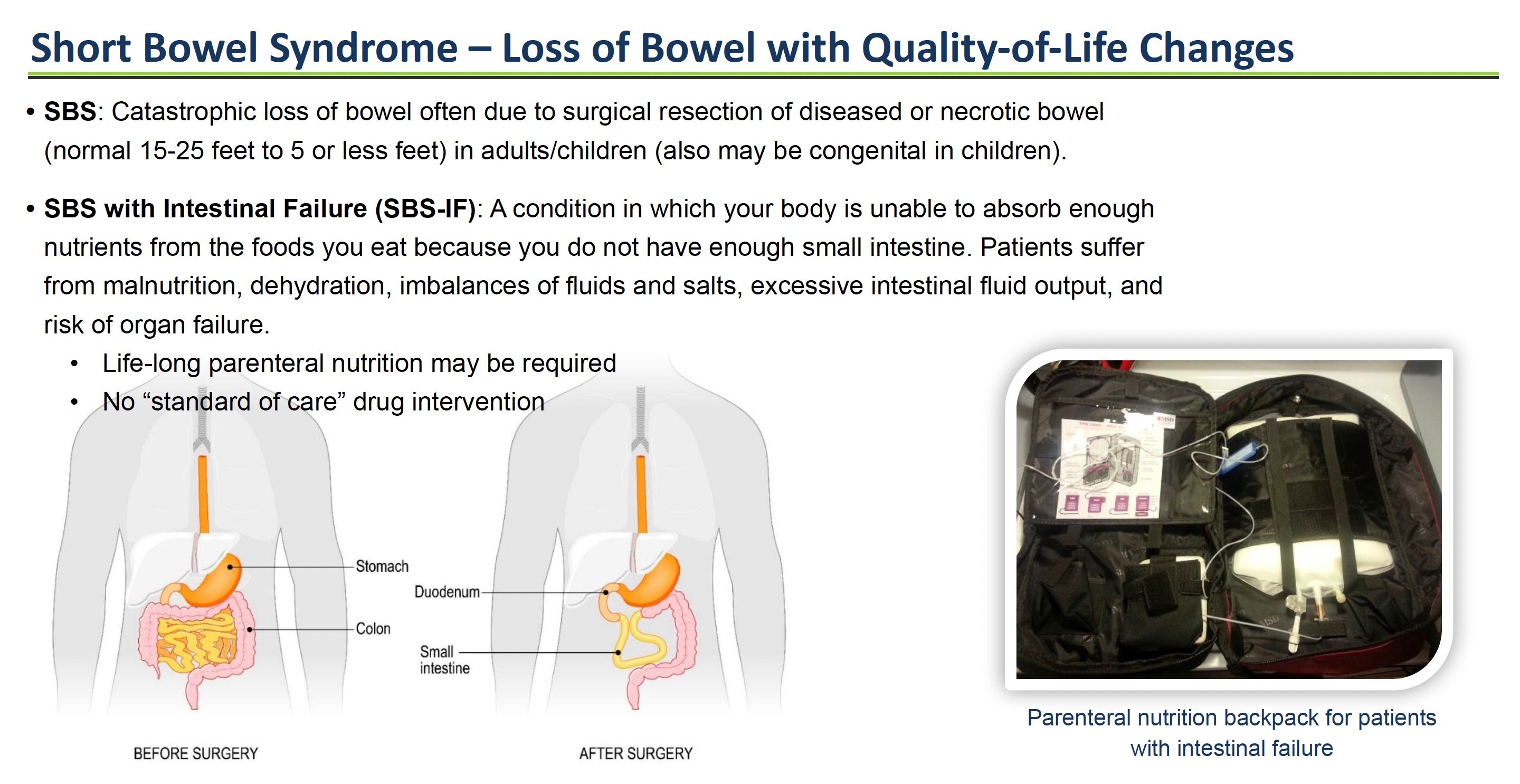

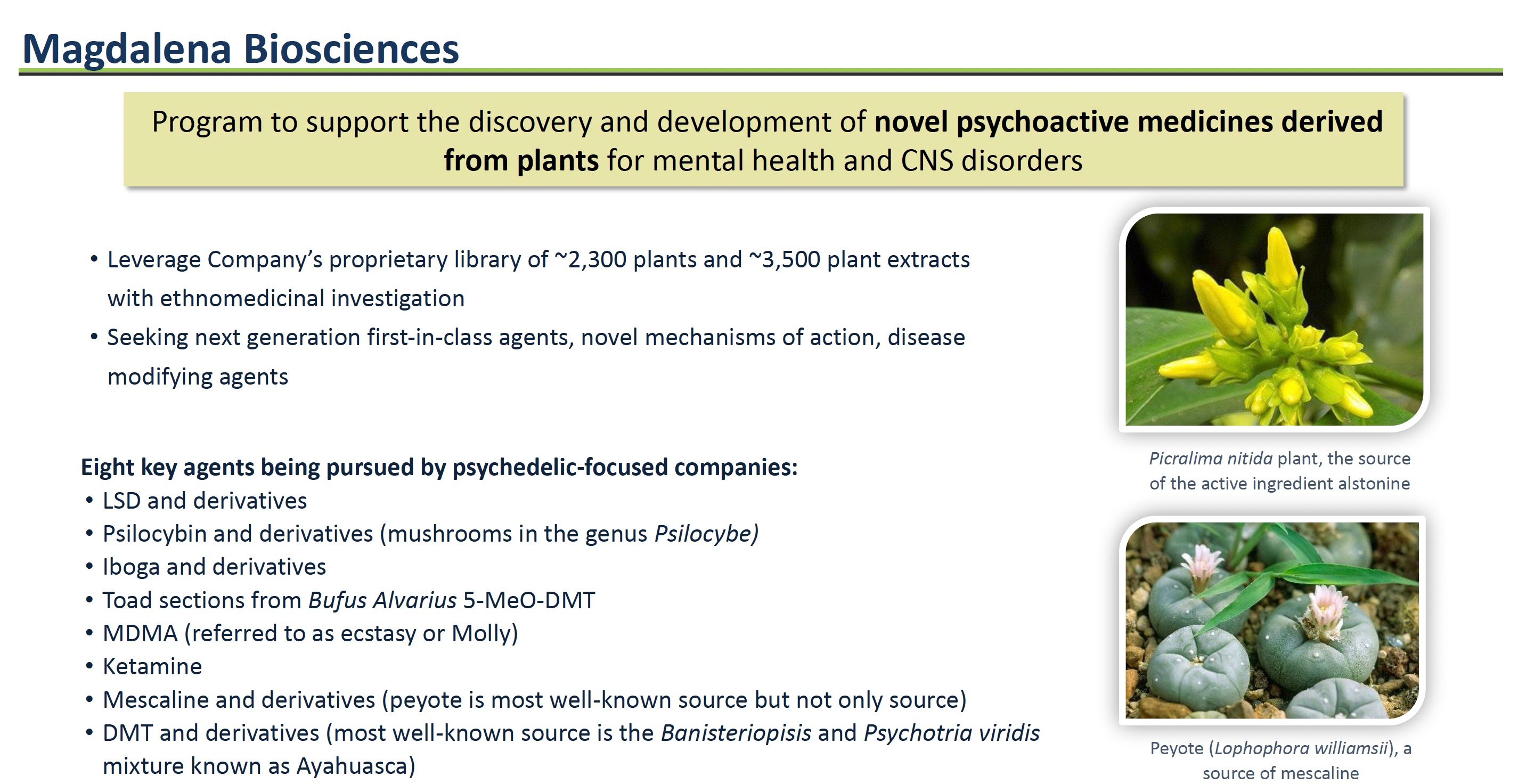
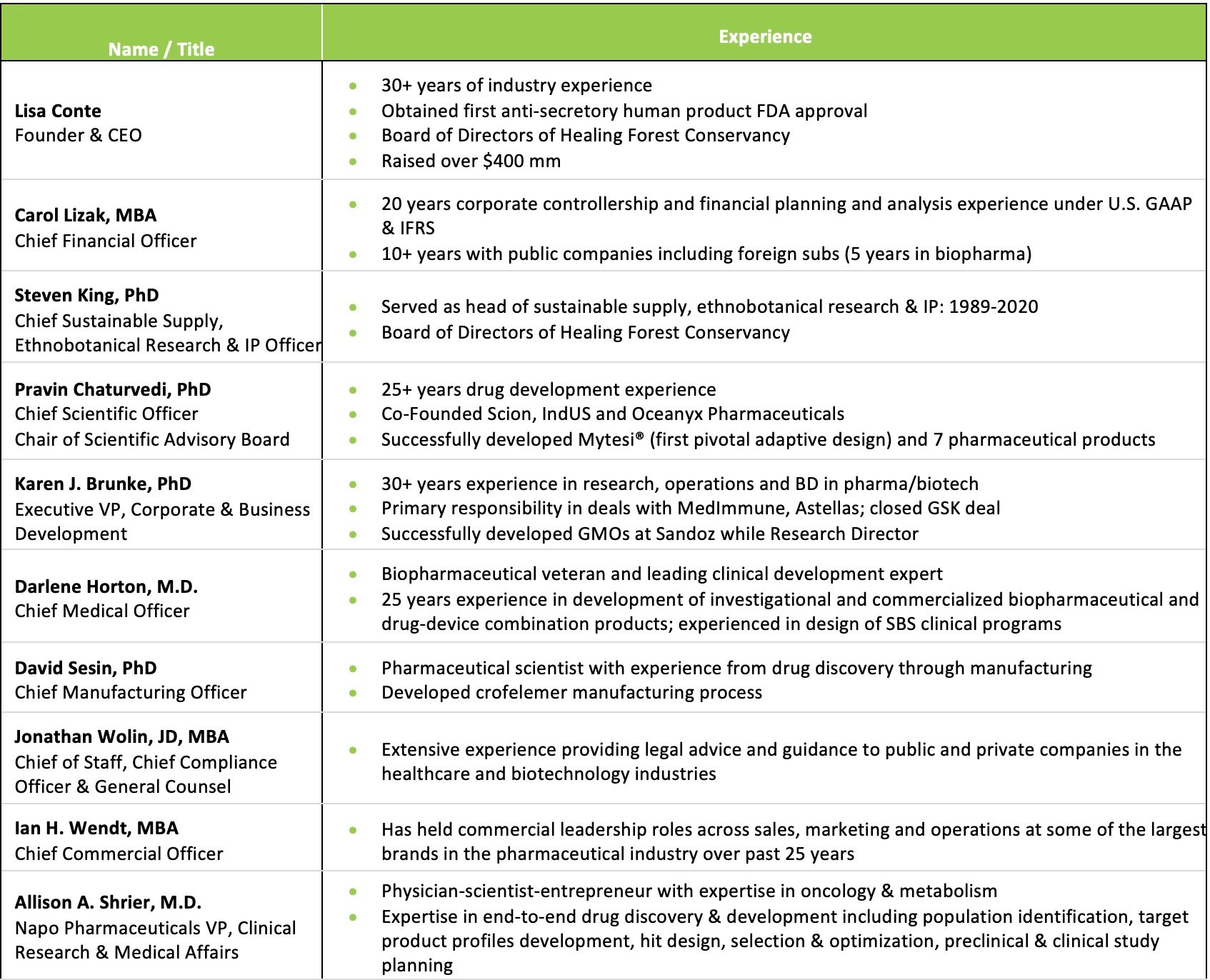



Driving Innovation in Oncology Treatments
OS Therapies develops advanced therapies to address rare cancers, focusing on immunotherapies and targeted drug technologies to improve patient outcomes.